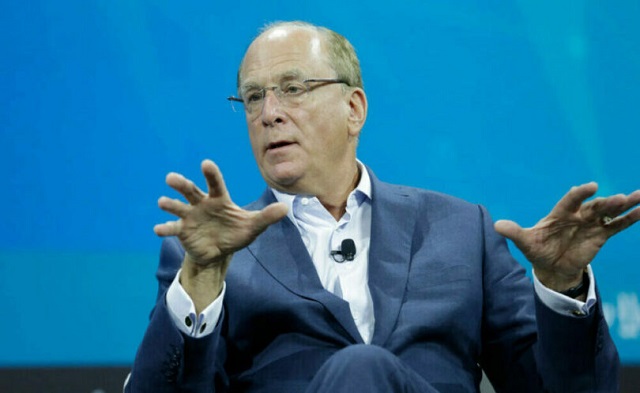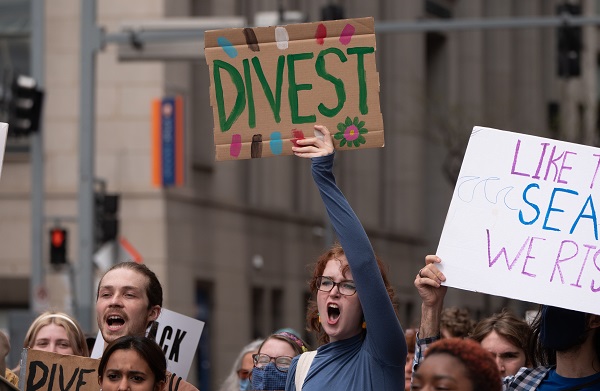Business
US firms like BlackRock are dropping their climate obsession while Europe ramps theirs up

Larry Fink on stage at the 2022 New York Times DealBook on November 30, 2022. in New York CityPhoto by Thos Robinson/Getty Images for The New York Times
From LifeSiteNews
By David James
As U.S. firms such as BlackRock and JPMorgan Chase continue to distance themselves from the ESG and ‘climate change’ agendas, Europe has been moving aggressively in the opposite direction, suggesting a rift is forming on the global economic landscape.
The climate change debate is usually thought to be focused on scientific analyses of the earth’s atmosphere. But that is only what is on the surface. It is also very much about money and politics and there has been a big shift that looks likely to threaten support for the net zero initiative. It may lead to a deep economic and political rift between the U.S. and Europe.
Estimates of the cost of decarbonizing the economy by 2050 have varied, but it is generally agreed that it is a financial bonanza. Goldman Sachs is at the low end with a modest $80 trillion while Bank of America estimates an extraordinary $275 trillion, about 10 times the current value of the U.S. stock market.
The finance sector, dizzy with the prospect of a huge investment opportunity, imposed a metric on corporations called Environmental, Social and Governance (ESG), a mechanism for demanding that companies go down the net zero route – and also comply with diversity equity and inclusion (DEI) requirements, the “S” part of ESG. Corporations that did not cooperate were threatened with a loss of support in the market and lower relative share prices.
That trend is starting to reverse. BlackRock, JPMorgan Chase, and State Street recently exited from Climate Action 100+, a coalition of the world’s largest institutional investors that pledges to “ensure the world’s largest corporate greenhouse gas emitters take necessary action on climate change.” The passive fund Vanguard, the world’s second largest, exited over a year ago.
These four fund managers oversee assets of about $25 trillion, which is approximately a quarter of the entire funds under management in the world.
They are changing direction for two reasons. First, there was an implicit bargain with ESG, whereby compliant companies would not only get to save the environment but also get to see their share prices outperform non-compliant companies. It is not turning out that way. In fact, better returns have come from investing against ESG-compliant companies.
More compellingly, 16 conservative state attorneys general in the U.S. have demanded answers from BlackRock’s directors regarding the Climate Action and ESG initiatives. Other fund managers and banks have also attracted unwanted scrutiny.
Nothing concentrates the mind of fund managers more than the prospect of clients withdrawing their funds – in this case state government pension money. Larry Fink, chief executive of BlackRock, is now saying he does not think it is helpful to use the term ESG, having been one of the most aggressive advocates. In his 2022 letter to CEOs he was issuing veiled threats to companies not complying with ESG. In 2024, he omitted the term entirely.
Meanwhile in Europe, very different choices are being made. The European Union (EU) is looking to impose sustainability reporting standards on all medium and large businesses. The intention is to have European companies set up a new accounting system by the end of the decade. Rather than recording financial transactions, it will instead aggregate data related to climate, pollution, especially carbon dioxide emissions, biodiversity and social issues.
As one (anonymous) analyst writes: “It is a very detailed control system for European companies where the European Commission can, in the future, dictate anything it wants – and punish for any violations any way it wants. Apart from the crazy regulatory load, this initiative can only be seen as a direct seizure of operational control of European companies, and thereby the European economy.”
So, while the U.S. looks to restore an unsteady version of capitalism, Europe is heading towards some kind of climate-driven socialism.
The EU plan seems to be to eventually direct their banks’ lending, which would radically undermine the region’s free-market system and establish something more like communist-style centralized control.
This does not mean U.S. governments and bureaucrats will stop pushing their climate agenda. A court case brought by the city of Honolulu, for example, is one of several attempts to bankrupt the American energy industry. But when the big institutional money changes direction then corporations and governments eventually follow.
The situation is further complicated by the emergence of the expanded BRICS alliance, which will soon represent a bigger proportion of the world economy than the G7. Saudi Arabia, Iran, United Arab Emirates, Ethiopia and Egypt will be added to the original group of Brazil, Russia, India, China and South Africa.
The BRICS nations will not allow the West’s climate change agenda to reshape their polities. Most of them are either sellers or heavy consumers of fossil fuels. Both India and China are increasing their use of coal, for instance, which makes Western attempts to reduce emissions largely pointless.
The promise that hundreds of trillions of investment opportunities would come from converting to net zero was always just a financial projection, mere speculation. The scale of transiting to a decarbonized economy would be so enormous it would inevitably become a logistical nightmare, if not an impossibility.
Energy expenditure represents about an eighth of the world’s GDP. Oil, natural gas and coal still provide 84 percent of the world’s energy, down just two per cent from 20 years ago. Production of renewable energy has increased but so has overall consumption. Oil powers 97 percent of all transportation.
Relying solely on renewable energy was never realistic and now that the financial dynamic is changing the prospects of achieving net zero have become even more remote. As the finance website ZeroHedge opines: “Both the DEI and ESG gravy trains on Wall Street are finally coming to an unceremonious end.” Financial markets continually get seduced by fads; the ESG agenda is starting to look like yet another example.
Automotive
The EV ‘Bloodbath’ Arrives Early

 From the Daily Caller News Foundation
From the Daily Caller News Foundation
By David Blackmon
Ever since March 16, when presidential candidate Donald Trump created a controversy by predicting President Joe Biden’s efforts to force Americans to convert their lives to electric-vehicle (EV) lifestyles would end in a “bloodbath” for the U.S. auto industry, the industry’s own disastrous results have consistently proven him accurate.
The latest example came this week when Ford Motor Company reported that it had somehow managed to lose $132,000 per unit sold during Q1 2024 in its Model e EV division. The disastrous first quarter results follow the equally disastrous results for 2023, when the company said it lost $4.7 billion in Model e for the full 12-month period.
While the company has remained profitable overall thanks to strong demand for its legacy internal combustion SUV, pickup, and heavy vehicle models, the string of major losses in its EV line led the company to announce a shift in strategic vision in early April. Ford CEO Jim Farley said then that the company would delay the introduction of additional planned all-electric models and scale back production of current models like the F-150 Lightning pickup while refocusing efforts on introducing new hybrid models across its business line.
General Motors reported it had good overall Q1 results, but they were based on strong sales of its gas-powered SUV and truck models, not its EVs. GM is so gun-shy about reporting EV-specific results that it doesn’t break them out in its quarterly reports, so there is no way of knowing what the real bottom line amounts to from that part of the business. This is possibly a practice Ford should consider adopting.
After reporting its own disappointing Q1 results in which adjusted earnings collapsed by 48% and deliveries dropped by 20% from the previous quarter, Tesla announced it is laying off 10 percent of its global workforce, including 2,688 employees at its Austin plant, where its vaunted Cybertruck is manufactured. Since its introduction in November, the Cybertruck has been beset by buyer complaints ranging from breakdowns within minutes after taking delivery, to its $3,000 camping tent feature failing to deploy, to an incident in which one buyer complained his vehicle shut down for 5 hours after he failed to put the truck in “carwash mode” before running it through a local car wash.
Meanwhile, international auto rental company Hertz is now fire selling its own fleet of Teslas and other EV models in its efforts to salvage a little final value from what is turning out to be a disastrous EV gamble. In a giant fit of green virtue-signaling, the company invested whole hog into the Biden subsidy program in 2021 with a mass purchase of as many as 100,000 Teslas and 50,000 Polestar models, only to find that customer demand for renting electric cars was as tepid as demand to buy them outright. For its troubles, Hertz reported it had lost $392 million during Q1, attributing $195 million of the loss to its EV struggles. Hertz’s share price plummeted by about 20% on April 25, and was down by 55% for the year.
If all this financial carnage does not yet constitute a “bloodbath” for the U.S. EV sector, it is difficult to imagine what would. But wait: It really isn’t all that hard to imagine at all, is it? When he used that term back in March, Trump was referring not just to the ruinous Biden subsidy program, but also to plans by China to establish an EV-manufacturing beachhead in Mexico, from which it would be able to flood the U.S. market with its cheap but high-quality electric models. That would definitely cause an already disastrous domestic EV market to get even worse, wouldn’t it?
The bottom line here is that it is becoming obvious even to ardent EV fans that US consumer demand for EVs has reached a peak long before the industry and government expected it would.
It’s a bit of a perfect storm, one that rent-seeking company executives and obliging policymakers brought upon themselves. Given that this outcome was highly predictable, with so many warning that it was in fact inevitable, a reckoning from investors and corporate boards and voters will soon come due. It could become a bloodbath of its own, and perhaps it should.
David Blackmon is an energy writer and consultant based in Texas. He spent 40 years in the oil and gas business, where he specialized in public policy and communications.
Business
UN plastics plans are unscientific and unrealistic

News release from the Coalition of Concerned Manufacturers and Businesses of Canada
“We must focus on practical solutions and upgrading our recycling infrastructure, not ridiculous restrictions that will harm our health care system, sanitary food supply, increase costs and endanger Canadians’ safety, among other downsides.”
This week Ottawa welcomes 4,000 delegates from the United Nations to discuss how they will oversee a reduction and even possible elimination of plastics from our lives. The key problem is no one has ever figured out how they will replace this essential component of our modern economy and society. The Coalition of Concerned Manufacturers and Businesses of Canada (CCMBC) has launched an information campaign to discuss the realities of plastic, how it contributes massively to our society and the foolishness of those who think plastics can be eliminated or greatly reduced without creating serious problems for key industries such as health care, sanitary food provision, many essential consumer products and safety/protective equipment, among others. CCMBC President Catherine Swift said “The key goal should be to keep plastics in the economy and out of the environment, not eliminate many valuable and irreplaceable plastic items. The plastics and petrochemical industries represent about 300,000 jobs and tens of billions contribution to GDP in Canada, and are on a growth trend.”
The UN campaign to ban plastics to date has been thwarted by reality and facts. UN efforts to eliminate plastics began in 2017, motivated by such terrible images as rivers with massive amounts of floating plastic and animals suffering from negative effects of plastic materials. Although these images were dramatic and disturbing, they do not represent the big picture of what is really happening and do not take into account the many ways plastics are hugely positive elements of modern society. Swift added “Furthermore, Canada is not one of the problem countries with respect to plastics waste. Developing countries are the main culprits and any solution must involve helping the leading plastics polluters find workable solutions and better recycling technology and practices.”
The main goal of plastic is to preserve and protect. Can you imagine health care without sanitary, flexible, irreplaceable and recyclable plastic products? How would we keep our food fresh, clean and healthy without plastic wraps and packaging? Plastic replaces many heavier and less durable materials in so many consumer products too numerous to count. Plastics help the environment by reducing food waste, replacing heavier materials in automobiles and other products that make them more energy-efficient. Many plastics are infinitely recyclable and innovations are taking place to improve them constantly. What is also less known is that most of the replacements for plastics are more expensive and actually worse for the environment.
Swift stated “Environment Minister Steven Guilbeault has been convinced by the superficial arguments that plastics are always bad despite the facts. He has pursued a campaign against all plastics as a result, without factoring in the reality of the immense value of plastic products and that nothing can replace their many attributes. Fortunately, the Canadian Federal court overturned his absurd ban on a number of plastic products on the basis that it was unscientific, impractical and impinged upon provincial jurisdiction.” Sadly, Guilbeault and his Liberal cohorts plan to appeal this legal decision despite its common-sense conclusions. Opinion polls of Canadians show that a strong majority would prefer this government abandon its plastics crusade at this point, but history shows these Liberals prefer pursuing their unrealistic and costly ideologies instead of policies that Canadians support.
The bottom line is that plastics are an essential part of our modern society and opposition has been based on erroneous premises and ill-informed environmentalist claims. Swift concluded “Canada’s record on plastics is one of the best in the world. This doesn’t mean the status quo is sufficient, but we must focus on practical solutions and upgrading our recycling infrastructure, not ridiculous restrictions that will harm our health care system, sanitary food supply, increase costs and endanger Canadians’ safety, among other downsides.” The current Liberal government approach is one that has no basis in fact or science and emphasizes virtue-signaling over tangible and measurable results. Swift noted “The UN’s original founding purpose after World War II was to prevent another world war. Given our fractious international climate, they should stick to their original goal instead of promoting social justice warrior causes that are unhelpful and expensive.”
The CCMBC was formed in 2016 with a mandate to advocate for proactive and innovative policies that are conducive to manufacturing and business retention and safeguarding job growth in Canada.
SOURCE Coalition of Concerned Manufacturers and Businesses of Canada
-

 Energy2 days ago
Energy2 days agoAnti-LNG activists have decided that they now actually care for LNG investors after years of calling to divest
-

 Censorship Industrial Complex2 days ago
Censorship Industrial Complex2 days agoDesperate Liberals move to stop MPs from calling Trudeau ‘corrupt’
-

 International2 days ago
International2 days agoUN attacks stay-at-home motherhood as ‘gender inequality’
-

 Brownstone Institute2 days ago
Brownstone Institute2 days agoIs the Overton Window Real, Imagined, or Constructed?
-

 conflict2 days ago
conflict2 days agoCol. Douglas Macgregor torches Trump over support for bill funding wars in Ukraine and Israel
-

 Frontier Centre for Public Policy1 day ago
Frontier Centre for Public Policy1 day agoThe end of Canada: The shift from democracy to totalitarian behavior in the ‘pandemic era’
-

 Energy1 day ago
Energy1 day agoReflections on Earth Day
-

 Alberta16 hours ago
Alberta16 hours agoAlberta rejects unconstitutional cap on plastic production






